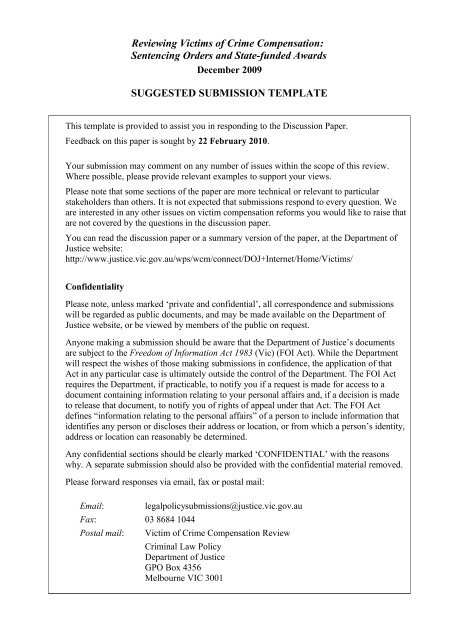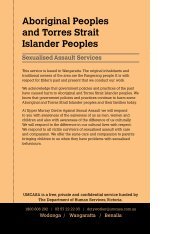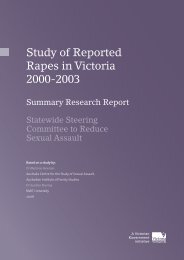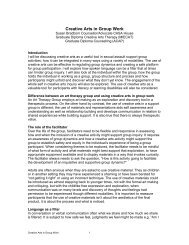Reviewing Victims of Crime Compensation, Sentencing Orders and ...
Reviewing Victims of Crime Compensation, Sentencing Orders and ...
Reviewing Victims of Crime Compensation, Sentencing Orders and ...
You also want an ePaper? Increase the reach of your titles
YUMPU automatically turns print PDFs into web optimized ePapers that Google loves.
<strong>Reviewing</strong> <strong>Victims</strong> <strong>of</strong> <strong>Crime</strong> <strong>Compensation</strong>:<br />
<strong>Sentencing</strong> <strong>Orders</strong> <strong>and</strong> State-funded Awards<br />
December 2009<br />
SUGGESTED SUBMISSION TEMPLATE<br />
This template is provided to assist you in responding to the Discussion Paper.<br />
Feedback on this paper is sought by 22 February 2010.<br />
Your submission may comment on any number <strong>of</strong> issues within the scope <strong>of</strong> this review.<br />
Where possible, please provide relevant examples to support your views.<br />
Please note that some sections <strong>of</strong> the paper are more technical or relevant to particular<br />
stakeholders than others. It is not expected that submissions respond to every question. We<br />
are interested in any other issues on victim compensation reforms you would like to raise that<br />
are not covered by the questions in the discussion paper.<br />
You can read the discussion paper or a summary version <strong>of</strong> the paper, at the Department <strong>of</strong><br />
Justice website:<br />
http://www.justice.vic.gov.au/wps/wcm/connect/DOJ+Internet/Home/<strong>Victims</strong>/<br />
Confidentiality<br />
Please note, unless marked ‘private <strong>and</strong> confidential’, all correspondence <strong>and</strong> submissions<br />
will be regarded as public documents, <strong>and</strong> may be made available on the Department <strong>of</strong><br />
Justice website, or be viewed by members <strong>of</strong> the public on request.<br />
Anyone making a submission should be aware that the Department <strong>of</strong> Justice’s documents<br />
are subject to the Freedom <strong>of</strong> Information Act 1983 (Vic) (FOI Act). While the Department<br />
will respect the wishes <strong>of</strong> those making submissions in confidence, the application <strong>of</strong> that<br />
Act in any particular case is ultimately outside the control <strong>of</strong> the Department. The FOI Act<br />
requires the Department, if practicable, to notify you if a request is made for access to a<br />
document containing information relating to your personal affairs <strong>and</strong>, if a decision is made<br />
to release that document, to notify you <strong>of</strong> rights <strong>of</strong> appeal under that Act. The FOI Act<br />
defines “information relating to the personal affairs” <strong>of</strong> a person to include information that<br />
identifies any person or discloses their address or location, or from which a person’s identity,<br />
address or location can reasonably be determined.<br />
Any confidential sections should be clearly marked ‘CONFIDENTIAL’ with the reasons<br />
why. A separate submission should also be provided with the confidential material removed.<br />
Please forward responses via email, fax or postal mail:<br />
Email:<br />
Fax: 03 8684 1044<br />
Postal mail:<br />
legalpolicysubmissions@justice.vic.gov.au<br />
Victim <strong>of</strong> <strong>Crime</strong> <strong>Compensation</strong> Review<br />
Criminal Law Policy<br />
Department <strong>of</strong> Justice<br />
GPO Box 4356<br />
Melbourne VIC 3001
SUBMISSION OF [NAME OF YOUR ORGANISATION]<br />
Name:<br />
Carolyn Worth<br />
Position:<br />
Convenor CASA Forum<br />
Postal Address: PO Box 72 East Bentleigh 3165.<br />
Phone number: 9928 8741 0414 538 275<br />
Fax number: 9928 8749<br />
Email address: carolyn.worth@southernhealth.org.au<br />
Question<br />
Part 2. Introduction <strong>and</strong> guiding principles<br />
In your view, what is the key purpose <strong>of</strong> providing compensation to victims?<br />
main<br />
pape<br />
r<br />
short<br />
paper<br />
p 10 p 2<br />
• Recognition <strong>and</strong> acknowledgement by the State <strong>of</strong> their suffering;<br />
• To assist the victim’s recovery;<br />
• Recouping expenses incurred by a victim as a result <strong>of</strong> injury e.g. lost income following an<br />
assault.<br />
What do you think is the appropriate balance between the state or an <strong>of</strong>fender providing compensation<br />
in a victim compensation scheme?<br />
p 10 —<br />
1. The State has an obligation to provide compensation to victims <strong>of</strong> crime as without State assistance,<br />
very few victims have recourse to compensation as <strong>of</strong>fenders rarely have any means.<br />
2. If the State wishes to recoup costs from an <strong>of</strong>fender an efficient system should be established to<br />
enable this to happen. It should never be the responsibility <strong>of</strong> the victim.<br />
Do you think these principles are appropriate? Are there any other principles that should be considered<br />
when reviewing Victoria’s victim compensation scheme?<br />
Yes. An additional principle is that the State acknowledges a victim’s right to, <strong>and</strong> the State’s<br />
responsibility to, provide compensation.<br />
p 12 p 5<br />
Part 3. State funded victim assistance<br />
Apart from hearings, are there other ways <strong>of</strong> acknowledging a victim’s experience <strong>of</strong> crime?<br />
No. For some victims a hearing is an essential part <strong>of</strong> their healing. It is about giving time to listen to<br />
their situation in what they <strong>of</strong>ten see as the only legal jurisdiction to hear them. However, for others a<br />
Section 33 determination is a good solution. The present system is ideal as it provides the victim with a<br />
choice.<br />
p 21 —<br />
If an <strong>of</strong>fender is notified <strong>of</strong> a hearing <strong>and</strong> wishes to attend, how can their right to a fair hearing be<br />
respected while avoiding trauma to the victim?<br />
p 21 —<br />
The <strong>of</strong>fender’s right to a fair hearing is already addressed. However, victims are <strong>of</strong>ten subject to<br />
cross examination by an unrepresented alleged <strong>of</strong>fender or their representative. In order to adhere<br />
to the principle in the Victorian Charter <strong>of</strong> Human Rights <strong>and</strong> Responsibility Recognition <strong>and</strong><br />
equality before the law the unrepresented victim or their representative should have the right to<br />
cross examine the <strong>of</strong>fender.<br />
Submission to the Victim <strong>of</strong> <strong>Crime</strong> <strong>Compensation</strong> Review Page 1 <strong>of</strong> 8
Question<br />
Given VOCAT’s focus on the needs <strong>of</strong> victims, do magistrates sitting as VOCAT tribunal members<br />
require particular training when conducting hearings?<br />
Yes. Training should be given around<br />
• The consequences <strong>and</strong> effects <strong>of</strong> trauma<br />
• Child development <strong>and</strong> brain development theory<br />
• CALD <strong>and</strong> recently arrived communities.<br />
main<br />
pape<br />
r<br />
short<br />
paper<br />
p 21 —<br />
Part 4. Offender funded compensation orders<br />
Do the eligibility <strong>and</strong> exclusion requirements require review?<br />
p 27 —<br />
No.<br />
Is it appropriate to deduct a sum equal to the VOCAT award from a court ordered compensation order<br />
under section 85B or 86 <strong>of</strong> the <strong>Sentencing</strong> Act?<br />
In principle we would not support ‘double dipping’. For example, if a victim received loss <strong>of</strong> earnings<br />
compensation from VOCAT it would not be appropriate to ask for loss <strong>of</strong> earnings compensation at<br />
sentencing. Whether it is appropriate to deduct a sum <strong>of</strong> money depends on the nature or category <strong>of</strong><br />
the compensation awarded. Only in the case where there has been true ‘double dipping’ should there<br />
be a deduction or a refund. If loss <strong>of</strong> earnings were only claimed at VOCAT <strong>and</strong> only pain <strong>and</strong> suffering<br />
claimed under Section 85 (b) there is no ‘double dipping’ <strong>and</strong> different expenses have been claimed.<br />
Should the court consider ordering the <strong>of</strong>fender to pay the VOCAT amount to the state?<br />
p 31 —<br />
p 31 —<br />
Yes.<br />
What is the appropriate role <strong>of</strong> the OPP in compensation order applications?<br />
p 32 —<br />
• It is the role <strong>of</strong> the OPP to ascertain whether there are assets<br />
• To confiscate or restrain any assets available<br />
• As an administrative exercise to bring <strong>Sentencing</strong> Act applications as a matter <strong>of</strong> course.<br />
How could the enforcement <strong>of</strong> compensation orders be improved?<br />
p 34 —<br />
Primarily compensation should be paid by VOCAT. The State should recoup where it can. It should be<br />
the State’s responsibility to do the bulk <strong>of</strong> recouping <strong>of</strong> costs from <strong>of</strong>fenders as a collaborative effort<br />
between Victoria Police <strong>and</strong> DoJ.<br />
Should the asset confiscation scheme continue to support the victim compensation scheme? If so, how<br />
could the effectiveness <strong>of</strong> the scheme in relation to victim compensation be enhanced?<br />
p 36 —<br />
Yes. The mechanism is already in place for assets to be confiscated from <strong>of</strong>fenders. However, there is<br />
a reluctance on the part <strong>of</strong> the OPP to use it. These powers if used as a matter <strong>of</strong> course would make<br />
the scheme more effective.<br />
Submission to the Victim <strong>of</strong> <strong>Crime</strong> <strong>Compensation</strong> Review Page 2 <strong>of</strong> 8
Question<br />
Should a distinction be made between victims who are natural persons <strong>and</strong> corporate victims for the<br />
purposes <strong>of</strong> asset confiscation for compensation purposes? Should there be a distinction between<br />
different types <strong>of</strong> corporate victims?<br />
main<br />
pape<br />
r<br />
short<br />
paper<br />
p 37 —<br />
No. The mechanism is still there.<br />
Part 6. For discussion: Some ideas for reform<br />
In your opinion, what are the main advantages <strong>of</strong> the VOCAT system? What are the main<br />
disadvantages?<br />
p 42 p 14<br />
Advantages:<br />
• Do not have to have a criminal conviction to obtain a hearing<br />
• Interim awards can be made before the final decision<br />
• Hearings in appropriate cases<br />
• Awards not reliant on <strong>of</strong>fender paying compensation<br />
• Category <strong>of</strong> Other Expenses to aid in recovery<br />
Disadvantages:<br />
• Occasionally Magistrates behave inappropriately <strong>and</strong> insensitively towards victims<br />
• Modest amounts available for SFA <strong>and</strong> pain <strong>and</strong> suffering particularly in relation to family<br />
violence<br />
• Registrars reluctant to exercise their powers to make interim awards<br />
Myths:<br />
• Victim is always distressed by the hearing. This is not our experience.<br />
• Long delays. Not our general experience.<br />
• Offenders at the hearing is universally damaging for the victim. Not our experience.<br />
What improvements might be made to Victoria’s model for state-funded victim compensation?<br />
p 44 p 15<br />
• Dispense injury requirements for all categories <strong>of</strong> victims<br />
• Make confiscation a matter <strong>of</strong> course<br />
• More generous awards for SFA amounts<br />
• Make Family Violence <strong>and</strong> Sexual Assault amounts the same<br />
On balance it is not a bad system.<br />
Should Victoria consider payments to victims based on the <strong>of</strong>fence done rather than requiring pro<strong>of</strong> <strong>of</strong><br />
injury or other adverse effects?<br />
p 44 p 15<br />
No.<br />
Should consider dispensing with the category <strong>of</strong> injury.<br />
What are your comments on the current category caps <strong>and</strong> global caps in relation to the different<br />
categories <strong>of</strong> victims?<br />
• It is unclear why sexual assault <strong>and</strong> family violence are treated differently<br />
• Increase in global cap for primary victims has not practical application because very few victims<br />
receive awards near the maximum.<br />
• SFA should be increased to $15 000 maximum<br />
Would changes to the organisational structure <strong>of</strong> VOCAT, such as centralised administration <strong>of</strong><br />
applications, enhance its operation <strong>and</strong> service to victims?<br />
p 45 p 16<br />
p 46 —<br />
Not a centralised registry however, some smaller registries (where hearings do not take place) could be<br />
closed to cut costs e.g. Dromana registry could be closed as all hearings take place in Frankston, which<br />
is relatively close.<br />
Submission to the Victim <strong>of</strong> <strong>Crime</strong> <strong>Compensation</strong> Review Page 3 <strong>of</strong> 8
Question<br />
How could this system be improved or exp<strong>and</strong>ed?<br />
main<br />
pape<br />
r<br />
short<br />
paper<br />
p 46 —<br />
As above.<br />
Could a database <strong>of</strong> compensation order cases assist judges with these applications <strong>and</strong> promote<br />
consistency?<br />
p 46 —<br />
Yes.<br />
Is it appropriate to reduce compensation awards because <strong>of</strong> the <strong>of</strong>fender’s means?<br />
p 46 —<br />
No. The reality is that few <strong>of</strong>fenders have substantial means.<br />
Would it be reasonable for a person who pleads guilty or is found guilty or convicted to be required to<br />
lodge with the court a sworn statement <strong>of</strong> financial circumstances including assets <strong>and</strong> financial<br />
obligations?<br />
p 47 —<br />
Yes. However, it needs to be acknowledged that <strong>of</strong>fenders with substantial means have the capacity to<br />
hide their assets.<br />
Would the lodgement <strong>of</strong> a state <strong>of</strong> financial circumstances have any implications for court listings <strong>and</strong><br />
the scheduling <strong>of</strong> sentencing hearings?<br />
p 47 —<br />
It may. Lodgement would have to be enforced to make it take place in a timely manner.<br />
What would be the practical implications if a judge had questions about the contents <strong>of</strong> the sworn<br />
statement?<br />
p 47 —<br />
Although it potentially flies in the face <strong>of</strong> a defendant’s right to not incriminate themselves, if it takes<br />
place after sentencing it would not be a problem. However, a challenge to a statement could delay<br />
finalising a case.<br />
Do you think that VOCAT material should be used by the court to assist in the consideration <strong>of</strong> a<br />
compensation order at the time <strong>of</strong> conviction?<br />
p 47 —<br />
No.<br />
What comments do you have on possible improvements to information exchange in the victim<br />
compensation system?<br />
p 48 —<br />
As above.<br />
Submission to the Victim <strong>of</strong> <strong>Crime</strong> <strong>Compensation</strong> Review Page 4 <strong>of</strong> 8
Question<br />
What limits should be placed on asset confiscation for the purposes <strong>of</strong> paying compensation orders?<br />
How should the interests <strong>of</strong> third parties, such as family members, be protected?<br />
main<br />
pape<br />
r<br />
short<br />
paper<br />
p 48 —<br />
Hard question. Other jurisdictions deal with this issue. Some research needs to be conducted into how<br />
they deal with this matter.<br />
Should therapeutic <strong>and</strong> restorative justice processes play a greater role within the victim compensation<br />
system?<br />
p 49 —<br />
This is not the issue here. This review appears to be about levels <strong>of</strong> compensation, administrative issues<br />
<strong>and</strong> <strong>of</strong>fender contributions. Worth consideration at another time.<br />
Should the state seek to recover VOCAT award amounts, or compensation order amounts, from<br />
<strong>of</strong>fenders? If so, how <strong>and</strong> on what basis?<br />
p 49 p 16<br />
Yes.<br />
Consideration could be given to taking money from <strong>of</strong>fenders property <strong>and</strong> also future earnings.<br />
Should a victim compensation levy be imposed on <strong>of</strong>fenders to assist with funding victim compensation?<br />
If so, for what categories or types <strong>of</strong> <strong>of</strong>fences?<br />
p 50 p 17<br />
Yes. As a matter <strong>of</strong> course for acts <strong>of</strong> violence.<br />
Questions that arise from making compensation an integral part <strong>of</strong> the sentencing process include:<br />
- what is the role <strong>of</strong> the prosecutor in relation to the victim <strong>and</strong> the state?<br />
p 52 —<br />
The Prosecutor is central in the process proposed before. The Victorian Charter <strong>of</strong> Human Rights <strong>and</strong><br />
Responsibilities Recognition <strong>and</strong> equality before the law needs to be considered.<br />
- what criteria should apply to stop wealth <strong>of</strong>fenders buying a more lenient sentence by agreeing to pay<br />
more compensation.<br />
Can just legislate that it cannot be taken into account.<br />
If compensation is considered in all cases or as part <strong>of</strong> the sentencing process, could this discourage<br />
early pleas <strong>of</strong> guilt?<br />
p 52 —<br />
Not for most people. Average <strong>of</strong>fender has limited means. Everyone is equal before the law. Cannot<br />
buy your way out <strong>of</strong> trouble.<br />
Can compensation form an integral part <strong>of</strong> the sentencing process without appearing to be double<br />
punishment?<br />
p 52 —<br />
Yes as they are different considerations.<br />
Submission to the Victim <strong>of</strong> <strong>Crime</strong> <strong>Compensation</strong> Review Page 5 <strong>of</strong> 8
Question<br />
Should the special-condition power presently available only for adjourned undertakings be extended to<br />
apply to all sentencing options?<br />
main<br />
pape<br />
r<br />
short<br />
paper<br />
p 52 —<br />
Yes.<br />
Submission to the Victim <strong>of</strong> <strong>Crime</strong> <strong>Compensation</strong> Review Page 6 <strong>of</strong> 8









